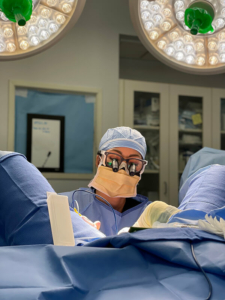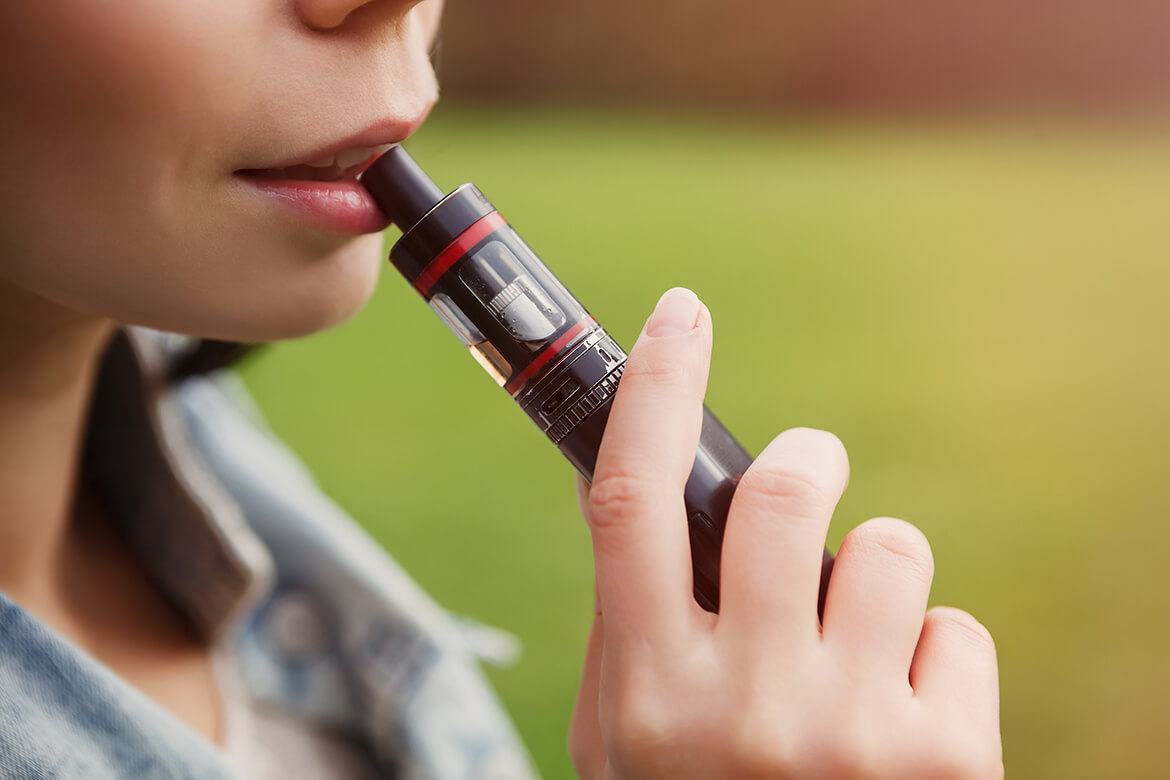Vaping and e-cigarettes have become popular alternatives to smoking tobacco. There’s a general perception that they’re somehow safer or healthier. The fact remains, however, that vaping is another vehicle for delivering the addictive substance nicotine into the body. Similar to tobacco cigarettes, the vaping liquid often contains a dangerous chemical cocktail that can be equally harmful to one’s health.
Here’s what you can commonly find in vaping liquid: nicotine, propylene glycol, glycerol, and flavoring (chemical flavoring can contain a proprietary blend of hundreds of chemicals that they don’t have to disclose).
Are you considering plastic surgery? If you vape then it’s a good idea to inform yourself about the possible risks and complications associated with vaping after a surgical procedure. Below are some facts and statistics you may find helpful about e-cigarettes and plastic surgery, and when it is safe to start vaping again.
Why Doctors Recommend You Stop Vaping After Surgery
We’ve learned some hard lessons about cigarettes, nicotine, and healing post-surgery. The biggest problem with nicotine is that it constricts blood vessels and impairs blood circulation in the body. According to a study by the American Association of Nurse Anesthetists, vaping was found to have similar adverse effects on surgical patients as those who smoke cigarettes.
Here’s why surgery and nicotine don’t mix. Most doctors will agree that having good blood circulation is generally preferred over the alternative. When it comes to recovering from any type of surgical procedure, therefore, it makes sense to abstain from any substances that will interfere with the body’s healing process.
Vaping Too Soon After Plastic Surgery is Riskier

Plastic surgery for cosmetic reasons is often much more complex than routine surgery. To simplify matters, your typical surgical procedure involves making an incision, removing or repairing the diseased organ, then closing the incision back up again. Not too many blood vessels are damaged or otherwise affected in the process.
A facelift, breast reduction, or tummy tuck, on the other hand, can involve a meticulous technique called plication. This is when muscle and tissue are separated from the skin first, then repositioned in a different location. Additionally, fat cells are sometimes transferred from one area to another for medical or aesthetic reasons.
Successful recovery from these types of procedures requires the thousands of tiny blood vessels that were severed during plication to reestablish a blood supply as quickly as possible. Patients who resume vaping too soon can experience problems such as insufficient blood flow and poor oxygenation needed for proper healing.
If you’re planning to have plastic surgery in the near future, your surgeon will most likely ask you about your smoking habits. Be honest about how much and often you vape. Be prepared for your surgeon to inform you that you won’t be able to vape at all during the recovery period.
Furthermore, you should wait four to six weeks after surgery before resuming. The longer you wait, the better. Doing so will significantly reduce your chances of developing the following complications:
Serious or life-threatening conditions: necrosis (irreversible death or tissue or fat cells), higher risk of infection, blood clots, heart attack and stroke, severe pain and discomfort, risk of your pain medication interacting with the nicotine.
Poor cosmetic outcomes: hypertrophic scarring, pigmentation issues, extremely slow wound healing time, and other minor surgical complications.
Something to keep in mind: some plastic surgeons will not operate on patients who smoke or vape as the risks are just too high. Make sure to clarify this point with your surgeon during your initial consultation.
What Current Science Says About Vaping
 Not convinced yet? Here’s what we know so far: smoking after plastic surgery can have a host of negative health consequences. Since we can extrapolate the health risks of smoking tobacco as being similar to e-cigarettes, a quick review of the existing literature has unearthed the following statistics.
Not convinced yet? Here’s what we know so far: smoking after plastic surgery can have a host of negative health consequences. Since we can extrapolate the health risks of smoking tobacco as being similar to e-cigarettes, a quick review of the existing literature has unearthed the following statistics.
- Facelift patients who smoked experienced a 13-times higher risk of skin necrosis than non-smokers. Skin necrosis is cell death that turns tissue black and can lead to more serious conditions if not treated.
- Breast reconstruction patients experienced higher rates of skin flap necrosis in the abdominal area and a greater incidence of mandatory mastectomy. (Skin flap refers to tissue that’s transferred from one area to another during plastic surgery).
- Specific to e-cigarettes, the vapor was found to be highly toxic to endothelial cells (those lining your arteries), even when nicotine was not detected.
- E-cigarettes impair blood flow and therefore oxygenation of tissue just as regular cigarettes.
Should You Stop Vaping Before Your Procedure?
If you have scheduled your surgery well in advance, you will want to give yourself the best chances of a successful recovery and favorable outcome. The healthier you are overall, the less risk there will be of developing complications while you’re under general anesthetic and of course during the crucial recovery period.
Abstaining from vaping after your procedure only (but not before) is not enough to guarantee that everything will go smoothly. Your body needs time to detoxify the vaping chemicals from your system, rebuild your cellular and vascular health, and prepare your body for the stress of the upcoming surgery.
Fortunately, your doctor will give you a timeframe of how long you need to stop smoking before surgery since every patient is different depending on how long and often they smoke. This will give you enough time to rebound and repair, even if you’ve been vaping for many years. Keep in mind that in order to avoid serious complications, you need to abstain from all nicotine products, including the patch, gum, or spray. Also, some plastic surgeons will require you to take a nicotine test as a part of your pre-operative clearance to guarantee your body has detoxified and is prepared for surgery.
How to Offset the Harmful Effects of Vaping

Let’s say you’ve made the commitment to stop vaping for your procedure, but now you’re concerned because you’ve been vaping for many years and you don’t want it to affect your surgery results. There are some nutritional changes you can make to improve your health and speed up your recovery.
We already discussed that vaping liquid contains not only nicotine but other toxins. These are known to generate free radicals that can cause a great deal of damage. Vitamins C and E are important antioxidants that help to neutralize free radicals in the body. In fact, it has been shown that people who vape could use supplementation with these and other antioxidants.
One way to get more antioxidants in your body is through diet. If you haven’t already, step up your nutrition game by consuming more fruit and vegetables. These contain a full spectrum of vitamins, minerals, and antioxidants that will help to rebuild your health and prepare you for surgery. Good sources of Vitamin-C include berries, broccoli, tomatoes, and potatoes. Vitamin-E-rich foods are nuts, seeds, corn, and leafy greens.
Another big benefit of Vitamin-C is that it helps to support your circulatory systems. This vital nutrient boosts collagen and elastin, which are the building blocks of skin, tissue, and blood vessels. It has been shown that increasing Vitamin-C levels in the diet is beneficial for strengthening the circulatory system.
If you feel that your nutritional intake is not adequate, you may want to incorporate supplements into your daily routine. Of course, before starting any new supplementation program first check with your physician or plastic surgeon. Call Dr. Cat’s office at 310-858-8808 today to schedule your consultation, or schedule a free pre-consultation phone call for general questions.



